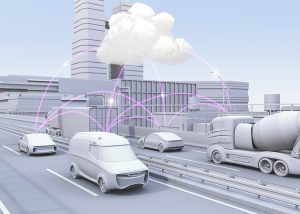The mobility of the future is digital, connected and available on demand. Centralised service platforms and data platforms use artificial intelligence to determine the most comfortable and efficient route, offer consumers the optimal means of transport to get from A to B and optimise traffic flow. This relieves the burden on transport infrastructures and consumers, resources, and the environment.
The connected mobility ecosystem of the future needs one thing above all: Data. The meaningful linking and intelligent evaluation of the growing amounts of data is the key to innovation and sustainable growth.
This year’s IAA has adopted the motto “Experience Connected Mobility” – but there is still a long way to go in Germany. The main reasons for the sluggish progress towards intelligent, sustainable mobility are reticence and legal uncertainty in dealing with mobility data. To pave the way for the digital transformation of the mobility ecosystem and to accelerate the transport revolution, eco recently published guidelines on the use of mobility data. The full position paper is available for download.
Brief overview: eco Position Paper on the Handling of Mobility Data
Eliminate legal uncertainties
Mobility data sharing is currently often hampered by a complex legal situation and ambiguities in data sovereignty and data protection. This problem needs to be addressed by bundling the existing legal provisions and more transparent rules on data sovereignty, especially in relation to vehicle data.
Improve data provision
The data stocks of the public sector and municipal transport companies are sometimes of enormous importance for smart city projects and sharing providers but also for autonomous driving. To improve the availability of this data, there needs to be a legal right to Open Data for public sector data and better technical and human resources for the municipalities.
Simplify deployment and access
If possible, the provision of mobility data should be done via a single platform. This should be established at the European level so that data exchange and use can occur across Europe without hurdles. At the very least, the national data spaces must be interoperable. Access to data should only be possible after identification to create transparency for data holders.
Define common standards
Due to the numerous data sources, common data standards are essential to enable the use, merging and exchange of data. Data standards should be developed in dialogue with all relevant stakeholders in multi-stakeholder formats and standardisation bodies.
Create efficient digital infrastructures
The necessary infrastructure must be created and expanded to exploit the potential of mobility data fully. This applies to gigabit infrastructure, storage capacities in data centres, and smart transport technology. Germany still has a lot of catching up to do in this area.
Make greater use of the potential of new forms of mobility
Sharing providers and other data-driven mobility service providers already fulfil an important function in the mobility of citizens in many cities and municipalities. It is crucial to make greater use of their advantages, for example by integrating the providers into urban transport planning and apps. Smart city and smart region projects should also be promoted and advanced more strongly and in the long term.
The full position paper is available for download.




